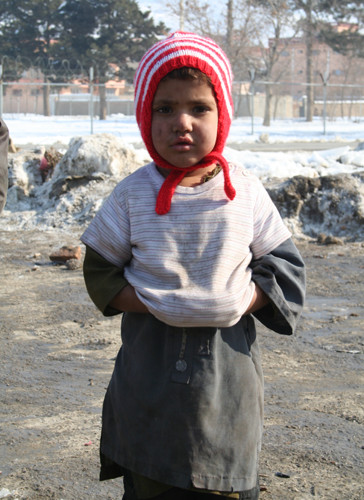By Salena Tramel

A child stands scantily dressed in blistering cold in the Helmandi IDPs camp in Kabul. The harsh winters killed many children in this camp. (Photo: RAWA.org)
For the residents of the Charahi Qambar refugee camp, it's been a long five years since they fled the U.S.-led destruction of their villages and put up tents in this destitute Kabul neighborhood. The majority is of Pashtun descent, from Afghanistan's southern Helmand Province, a warlord-torn region notorious for opium production. One would think that the 6,000 internally displaced people (IDPs) camping there for a half-decade have seen it all. But over the winter, it was not bombs but snowfalls that crushed shelters and threatened lives.
The tarps of Charahi Qambar run alongside one of the capital's outskirt roads and extend deep into the horizon -- juxtaposed with stunning views of the Hindu Kush. Our three-person Global Exchange delegation pulled up next to the tent-and-adobe city in a beat-up Corolla hatchback with an Afghan driver and guide. Several of the camp's elders came to meet us. They greeted us cautiously and pulled us inside the winding pathways ankle-deep with mud that turn to thick sheets of ice by night. We ducked into one of the tents and kneeled atop thin carpets on the freezing dirt floor.
As one of three Americans, and two women, among a few dozen Afghan tribal leaders, initial awkwardness faded into a feeling of welcome as green tea and conversations began to flow.
A group of six elders, elected by Charahi Qambar's IDPs, governs the camp -- a structure similar to the Council of Elders in the villages where they used to live. "We lost everything," said one of them, Ismael. He explained that as a farmer back in the Helmand Province, his harvests included staple foods like wheat and corn, along with seasonal vegetables. After NATO forces destroyed his home and livelihood, Ismael came to Kabul as a refugee. Today, his family survives on meager aid handouts. And as a camp representative, he cares for some 850 families, as well.
This winter brought the lowest temperatures in at least 20 years to Kabul, and in impoverished Charahi Qambar, supplies like firewood quickly dwindled. When a 70-year-old woman and seven children under the age of 5 froze to death in their camp, the elders experienced interchanging feelings of helplessness and outrage. "We are humans like everyone else, and our children shouldn't have to die," said Khoja Mohamed, also a chosen representative. "All we are asking for is a real home where we can be safe again," he lamented. He reiterated his point by using a Pashto proverb that says everyone should have a graveyard -- a place to rest -- in both life and death.
Others around the circle told us what brought them to Charahi Qambar. One man spoke of his uncle's daughter, who was killed in his village by a NATO bombing campaign. Another said that he lost his business when U.S. jets bombed the local bazaar. Bearded and wearing turbans, the elders emphasized that their choice of appearance was part of their culture. "We feel targeted by Western forces because of the way we look," said Ismael, "And most don't take the time to understand our religion."
The recent Qur'an burning at Bagram Airfield sent ripples of anger through Charahi Qambar. Some elders called for protests in the camp but opted for patience when President Karzai pleaded a peaceful reaction. "We have to respect our leader," said Khoja Mohamed, "But if you could take out my heart, you could see the pain. We are Muslim, and after all we have been through, they burned our holy book." Khoja Mohamed pointed out that the international community, including Western troops, were guests in Afghanistan. "No matter what, we will not punish many for the actions of one. We know how to separate the bad from the good, and we hope that your country can learn to do the same," he said.
In Charahi Qambar and the other 40 camps around Kabul, IDPs and their elders wait for an end to a winter -- both figuratively and literally -- that has lasted far too long.



